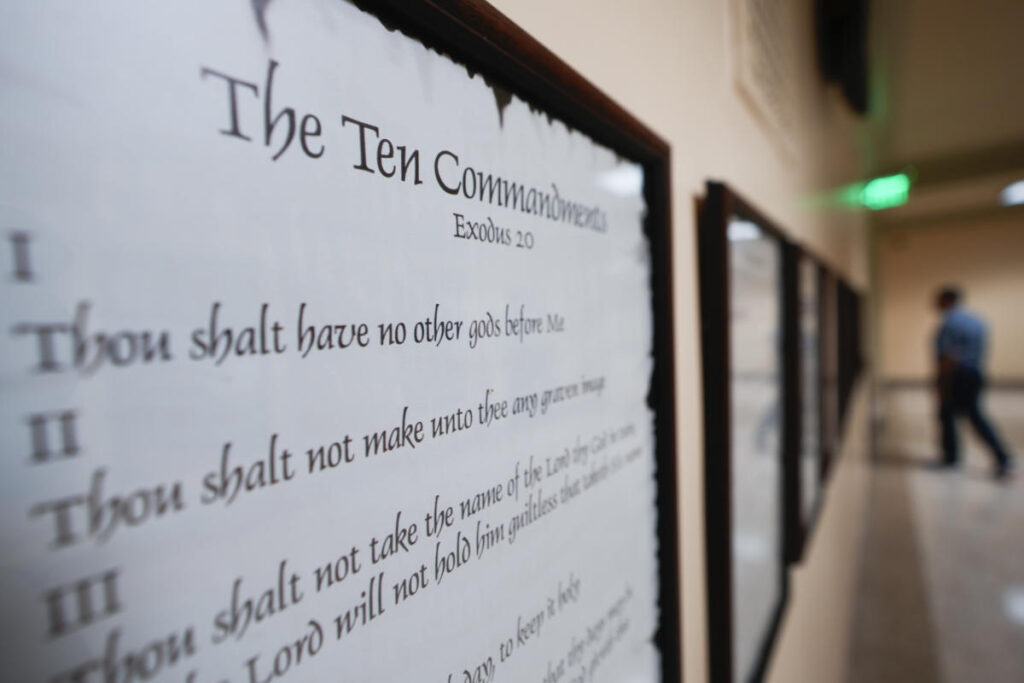A federal judge in Baton Rouge is set to hear arguments on a controversial new Louisiana law mandating the display of the Ten Commandments in every public school classroom by January 1, 2024. This case is part of a broader lawsuit challenging the law, brought forth by parents of Louisiana public school children representing diverse religious backgrounds. The plaintiffs contend that the law is an unconstitutional infringement on the separation of church and state and compromises the rights of non-Christian students. In stark contrast, supporters of the law claim that it is rooted not only in religious tradition, but that it also holds historical significance reflecting the foundations of U.S. law. The hearing, led by U.S. District Judge John W. deGravelles, is expected to raise critical questions regarding the implications of the law for public education.
The Louisiana law has generated significant discussion and controversy, particularly given the state’s positioning within the Bible Belt and its predominantly Republican political landscape. Louisiana stands out as the only state to enforce such a mandate for public school classrooms. Governor Jeff Landry, a conservative advocate for the measure, has expressed enthusiasm about defending the law in court, highlighting a perceived need to uphold traditional values in education. His dismissive comments toward concerned parents suggest a lack of sensitivity to the potential alienation faced by students who may not subscribe to Christian beliefs, emphasizing the divide over the law’s implications for inclusivity in schools.
Filling the legal void are several arguments presented against the law, chiefly the First Amendment’s Establishment Clause, which prohibits government entities from endorsing a specific religion. Activists and opponents argue that the forced display of religious texts like the Ten Commandments not only undermines religious liberty but also risks isolating students from varied faith backgrounds or those with no religious affiliation. The argument for the law typically hinges on its supporters asserting that it serves a secular educational purpose by teaching students about the historical and moral context of law in the United States, a claim that opponents rigorously contest as primarily religious in nature.
Supporting the measure have been notable conservative figures and organizations. Former President Donald Trump has publicly endorsed the initiative, reinforcing the narrative that intertwines education with religious principles. Such endorsements may amplify the conservative push for greater religious representation in schools across the nation, echoing similar legislative attempts in states like Florida and Oklahoma, where policies have started to blend religious messages with educational content. This growing trend invites broader discussions about the role of religion in public schooling, the implications for diverse student populations, and the potential erosion of church-state separation.
The logistical aspects of implementing the law are also contentious, as schools are expected to display the Ten Commandments prominently. Louisiana boasts over 1,300 public schools, alongside nearly 1,000 classrooms at Louisiana State University, potentially resulting in tens of thousands of required posters. While the law does not obligate public funding for these displays, proponents suggest that schools would rely on private donations to cover the costs associated with the mandated displays. However, practical challenges loom regarding enforcement—what happens if teachers refuse to post the commandments and whether adequate financial resources will be available to comply with the directive are concerns yet to be addressed.
As the legal battle unfolds, a temporary agreement between the court and the state has established that five specific schools involved in the lawsuit will refrain from displaying the commandments until at least November 15. Yet, the overarching timeline imposes a January 1, 2025, deadline for full compliance with the law statewide. This case not only reflects deep-rooted cultural and political divides over religious expression in public settings but also serves as a critical litmus test for the boundaries of religious influence over public education in America. As Judge deGravelles deliberates, the outcome may hold significant implications for similar legislative efforts across the nation and the ongoing discourse about the intersection of faith, law, and education.

